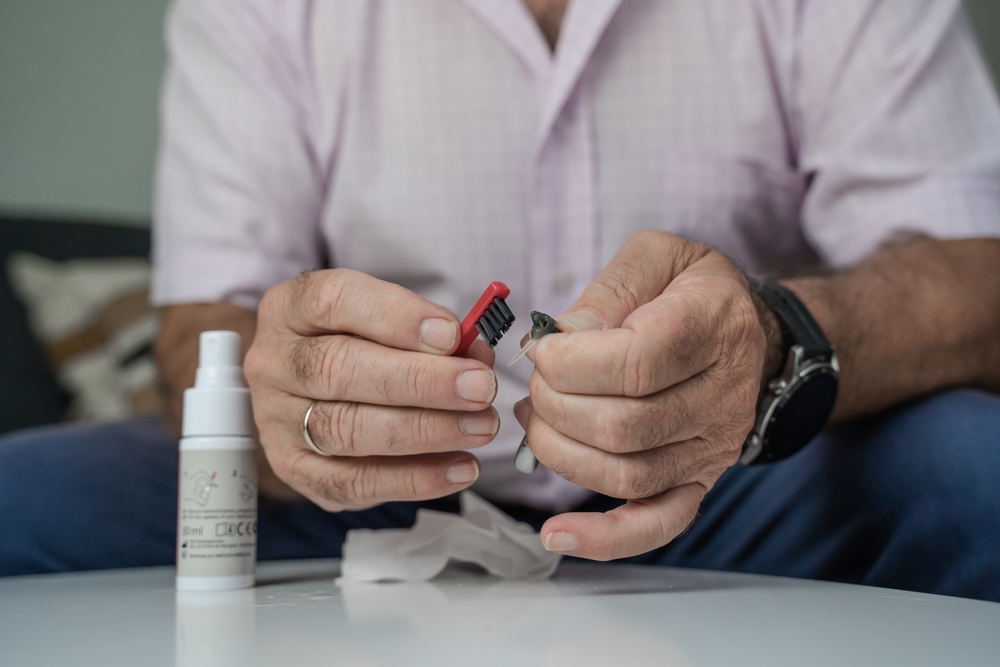
Hearing aids are crucial devices that improve your hearing and boost your quality of life. They do, however, need to be routinely cleaned and correctly maintained just like any technology does. Routine maintenance can substantially extend their lifespan and ensure you’re hearing clearly. Let’s take a look at some measures you can take to maintain your hearing aids.
Keeping your hearing aids clean and getting professional tunings
To keep your hearing aids working at their best, it’s essential to clean them on a daily or weekly schedule. The longevity of your hearing aid will be extended, and the sound quality will be improved by doing a quick, simple cleaning routine.
Together with your regular at-home care, periodic professional maintenance by a hearing professional is recommended. Think of it like going to the dentist, while brushing and flossing are helpful, professional cleanings ensure the best results. A deep clean by a professional is recommended every six months or so. This helps to identify any issues your device might have and helps keep it in excellent working order.
Basic everyday care tips
The performance and lifespan of your hearing aids can be substantially increased by utilizing these few basic tips. Avoid common hurdles by implementing these tips:
- Wash Hands Before Handling: Skin oils and debris can interfere with the function of your hearing aids so make sure you wash and dry your hands before handling them.
- Use a Dehumidifier: If it’s very humid, a dehumidifier can be used to keep the moisture away from your hearing aids.
- Safe Storage: When not in use, keep your hearing aids stored in a protective case or in their charging unit to prevent exposure to dirt or physical damage.
- Clean Before Bed: Cleaning your hearing aids at night gives them a chance to dry completely before you wear them again in the morning.
- Protect From Temperature Extremes: Avoid subjecting your hearing aids to extreme weather conditions. If it’s particularly cold or hot, leave your devices indoors instead of bringing them outside.
- Keep Them Free of Moisture and Chemicals: Moisture and chemicals can be damaging to your hearing aids. Be certain to take them out before taking a shower, swimming, or applying products like hairspray or perfume.
Tools for proper hearing aid care
Taking care of your hearing aids requires the right tools. Here are a few of the things you can expect to find in a hearing aid care kit:
- Wax pick or loop: To gently clear away earwax and debris from tight spaces
- Slim tube cleaner: For getting rid of debris stuck in the tubes.
- Microfiber cloth: Ideal for wiping down the surface of your hearing aids.
- Cleaning brush: For getting rid of dust and wax buildup.
- Hearing aid dryer: Helps get rid of moisture, especially after a long day of use.
Your hearing specialist can guide you on the right tools and techniques to keep your hearing aids in excellent condition.
Detailed cleaning determined by hearing aid type
Different models of hearing aids require somewhat different cleaning strategies. Two of the main types of hearing aids are Behind-the-ear (BTE) and In-The-Ear (ITE): Here are precise cleaning instructions for each type.
Cleaning In-The-Ear (ITE) hearing aids
- Remove Wax with a Loop: Any remaining earwax can be gently extracted using the loop or pick.
- Clear the Ventilation Tube: Push a thin cleaning tool through the vent tube to ensure there’s no blockage.
- Brush Debris Away: Carefully wipe away any earwax or debris from the surface of your hearing aid while holding it face down.
- Wipe the Exterior: Wipe down the entire outer surface with a microfiber cloth to clear away any debris.
How to clean Behind-The-Ear (BTE) hearing aids
- Clean the Microphone Openings: Clear the microphone of debris by brushing its opening.
- Detach the Tubing: Begin by separating the tubing from the hearing aid itself.
- Clear the Tubing: Push a pipe cleaner through the tubing to eliminate wax or moisture, then wipe the outside with a cloth.
- Use a Wax Pick: Remove any stubborn wax with a loop or pick.
- Clean the Aid: Gently wipe away any dirt or wax while holding the device face down, paying particular attention to the area around the receiver and microphone.
- Soak the Ear Mold: Loosen any buildup on the ear molds by removing them and soaking them in warm soapy water. Utilize a tubing blower to remove excess moisture and dry with a clean cloth.
- Reassemble and Test: Once everything is dry, reassemble your hearing aids and test to make sure they’re working correctly.
Preventing ear infections with proper hygiene
Keeping your ears clean is just as important as cleaning your hearing aid. Earwax buildup not only interferes with your hearing aids but can also result in discomfort and infection. Routinely cleaning your ears and hearing aids will help decrease the chance of these issues.
Make an appointment to have your hearing aids cleaned by a professional
If you have any questions about your hearing aids or would like to set up a professional cleaning, reach out to us today.
Professional maintenance is key to ensuring your hearing aids continue to work well for years to come.